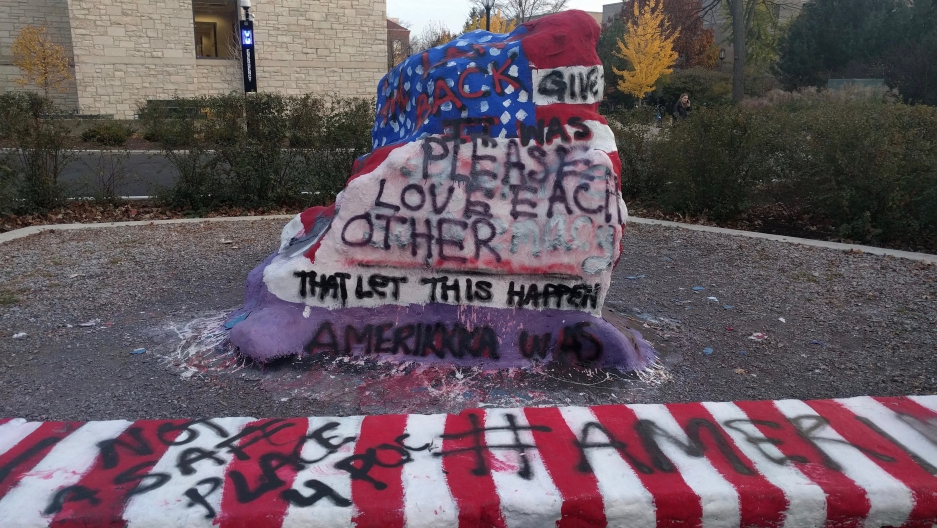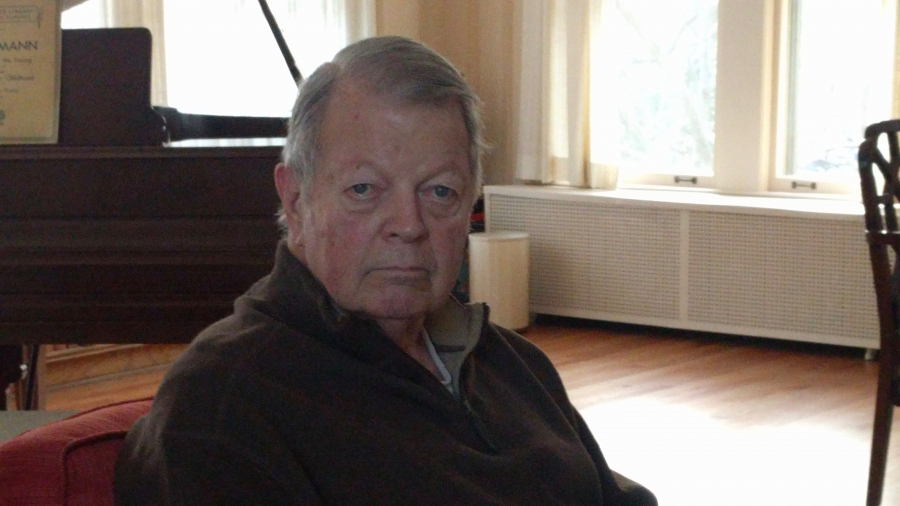Future Now
The IFTF Blog
Podcast: Trust, Faith & Trump
In (?) We Trust
by IFTF Research Fellow Mary Kay Magistad; reposted from Whose Century Is It? on PRI
It’s all beginning to sink in now. Come January, President Donald Trump will lead a deeply divided nation, united by a lack of trust in government and other core institutions.

Credit: Mary Kay Magistad
The Pew Research Center in late 2015 found that just 19 percent of respondents said they trust the government most or all of the time. Almost 90 percent of Republicans, and about 70 percent of Democrats, said they seldom, if ever, trust the government.
And it’s not just the US government that’s been running an alarming trust deficit. It’s the mainstream media, the healthcare system, public education, banks.
Some of the erosion in trust has come from experience, some from a deliberate campaign to erode trust in some of the institutions that make America, as a democracy, function. Garry Wills, professor emeritus at Northwestern University and an author of many books and essays on faith, trust and politics, finds it a rich irony that President Trump will be stepping into an office he helped degrade.

Credit: Mary Kay Magistad
"Trump has undermined the legitimacy of the Presidency for years, saying Obama has not got any claim on us, because he’s not really a (legitimate) President,” Wills says. “Now he wants to be a legitimate president. Well, good luck.”
In sharp contrast to President Barack Obama’s tenure, however, when the strategy of Republican leaders in office has been to block most of his agenda, Democrats are already looking to see where issues they care about align with campaign promises Trump made. It’s a response to the quandary of how to move a polarized nation back to a position of constructive engagement over differences, to a rebuilding of trust.
It’s been a long slide down to this level of distrust. Wills traces it back further than many commentators did in this election.
“One of the principal reasons, I believe, is the effects of World War II and the atomic bomb,” he says. “In my book Bomb Power, I talk about how secrecy, all of a sudden, took over government. ... Well, for people to distrust our government that is totally secret, is natural.”
But there’s also something else at play, Wills believes, something more to do with a reaction to America becoming an increasing secular, multicultural society.
“If you want to understand Trump’s followers, it is all a matter of holy ignorance,” he wrote in a Boston Globe essay earlier this year. “They cling to their identity, which is based not on argument, but on emotions like loyalty, solidarity with their people, fond memories, and a defiance of being told what to do by strangers.”
Of course, not everyone who voted for Trump did so for those reasons. Some are on the losing end of America’s growing income disparity, and believed Trump’s promises that only he could fix it. The fact that he offered vague pledges, while Hillary Clinton laid out detailed proposals, didn’t seem to matter, in the wake of media coverage who treated these two candidates, with their vastly different levels of experience, with a false equivalence.
The spread of false anti-Clinton "news" on Facebook only deepened a belief in many that a vote for Trump, or at least not for Hillary Clinton, was the only path toward a brighter future. Almost half of registered voters just stayed home. There’s irony in this, when so many Americans — women and African Americans in particular — had to fight for so long to get to vote.
There’s irony, too, in the fact that so many Americans were so under-informed about the issues, in a country where some states used to use a literacy test to deny the right to vote to people who couldn’t read, and thus understand the issues.
“This is a great cultural problem which goes back of course to Plato,” Wills says. “This is a problem of democracy. Who is qualified to tell us what to do and whom we should follow? Plato said only philosophers are qualified, and therefore we shouldn't ask ordinary people. The opposite side of that is my friend Gilbert Chesterton, who said Democracy is like blowing your nose. You may not do it very well, but you want to do it yourself.
Truth be told, Wills said, few people know everything they should about all the issues. “We’re all in something of a fog,” he says. “And the main thing we have to do is reach out to each other and encourage each other. How the hell do we get out of this fog?"
Mary Kay Magistad, IFTF Research Fellow and recovering foreign correspondent, is creator and host of the “Whose Century Is It?” podcast, a coproduction with PRI/BBC’s The World, exploring ideas, trends & twists shaping the 21st century. It’s available on iTunes, most podcast apps, and at pri.org/century.



